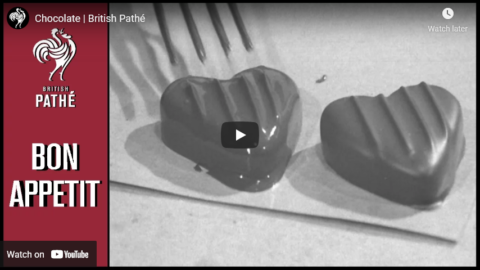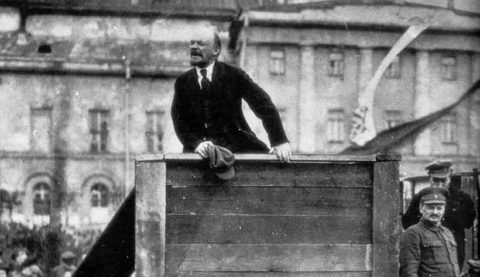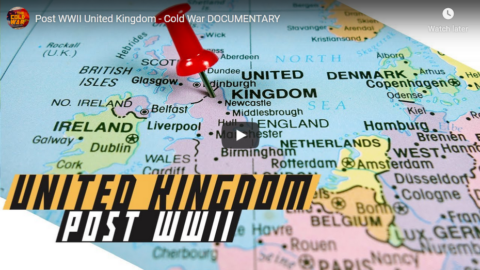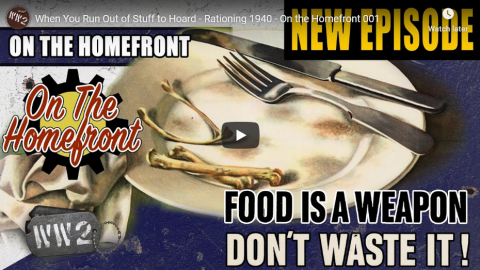YesterKitchen
Published 3 Nov 2019I hope you enjoy this special trip back in food history!! WW2 brought food rationing to America and American housewives needed recipes to accommodate the scarcity. Never fear, warm, hearty dishes such as this were created to feed the nation. This Tamale Pie is classic war ration cooking and is just YUM!
(more…)
September 7, 2022
Tamale Pie: What did WW2 Food Ration Stamps Look Like?
June 4, 2022
Cheese propaganda, 1940 | Archive Film Favourites
Imperial War Museums
Published 14 May 2022With rationing introduced early in 1940 in Britain, this public information film was created to advocate the advantages of eating cheese over meat. The film explains not only the health benefits of cheese with some (unverified) experiments, but also its versatility in cooking, from grilled cheese to califlower cheese, “a meal in itself.” Film curator Matt Lee introduces us to this brilliant cheese propaganda.
You can watch the full Choose Cheese film on IWM’s Film Archive: https://film.iwmcollections.org.uk/re…
Subscribe to our channel for more films from the archives every Thursday!Browse the full IWM film collection and find out more about licencing this film or many others: https://bit.ly/iwmfilms
While our doors are temporarily closed, we still have millions of unforgettable stories to share with you. Your support is invaluable to help ensure we can share them with generations to come – please consider supporting Imperial War Museums today. Support us: https://www.iwm.org.uk/support-us/don…
Follow IWM on social media:
Twitter: https://twitter.com/I_W_M
Instagram: https://www.instagram.com/imperialwar…
March 22, 2022
West Germany’s Wirtschaftwunder — the staggering economic postwar recovery
Christian Monson debunks the common tale taught in western schools of reason for the amazing recovery of West Germany’s economy after World War Two:
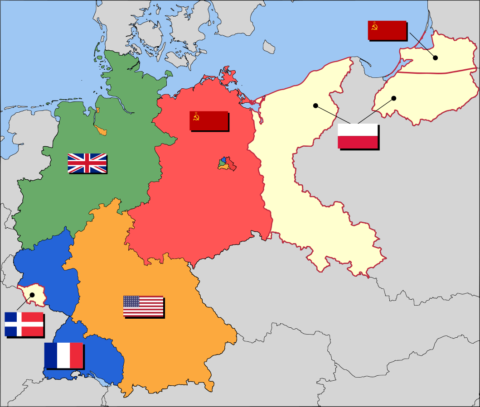
Occupation zone borders in Germany, 1947. The territories east of the Oder-Neisse line, under Polish and Soviet administration/annexation, are shown as cream as is the likewise detached Saar protectorate. Berlin is the multinational area within the Soviet zone.
Image based on map data of the IEG-Maps project (Andreas Kunz, B. Johnen, and Joachim Robert Moeschl of the University of Mainz) — www.ieg-maps.uni-mainz.de, via Wikimedia Commons.
This “economic miracle” is commonly referred to as die Wirtschaftswunder. But how did Germany go from rubble to riches in just a decade while neutral countries like Spain merely treaded economic water? If you ask your average American history student, they will say the Marshall Plan, of course!
Unfortunately, the ubiquity of the myth that the Marshall Plan rebuilt Germany is proof that state-controlled education favors propaganda over economic literacy. Despite the fact that most modern historians don’t give the Marshall Plan much credit at all for rebuilding Germany and attribute to it less than 5 percent of Germany’s national income during its implementation, standard history textbooks still place it at the forefront of the discussion about post-war reconstruction.
Consider this section from McDougal Littell’s World History (p. 968), the textbook I was given in high school:
This assistance program, called the Marshall Plan, would provide food, machinery, and other materials to rebuild Western Europe. As Congress debated the $12.5 billion program in 1948, the Communists seized power in Czechoslovakia. Congress immediately voted approval. The plan was a spectacular success.
Of course, the textbook makes no mention of the actual cause of the Wirtschaftwunder: sound economic policy. That’s because, for the state, the Marshall Plan makes great statist mythology.
Not only is it frequently brought up to justify the United States getting involved in foreign conflicts, but it simply gives support for central planning. Just look at the economic miracle the government was able to create with easy credit, they say.
And of course, admitting that the billions of dollars pumped into Germany after WWII accomplished next to nothing, especially when compared to something as simple as sound money, would be tantamount to admitting that the government spends most of its time making itself needed when it isn’t and thereby doing little besides getting in the way.
Credit for the turnaround should be accorded to Ludwig Erhard, according to Alasdair Macleod at the Cobden Centre:
Anyone who favours regulation needs to explain away Germany’s post-war success. Her economy had been destroyed, firstly by the Nazi war machine, and then by Allied bombing. We easily forget the state of ruin the country was in, with people in the towns and cities actually starving in the post-war aftermath. The joint British and American military solution was to extend and intensify war-time rationing and throw Marshall aid at the problem.
Then a man called Ludwig Erhard was appointed director of economics by the Bizonal Economic Council, in effect he became finance minister. He decided, against British and American misgivings, as well as opposition from the newly-recreated Social Democrats, to do away with price controls and rationing, which he did in 1948. These moves followed his currency reform that June, which contracted the money supply by about 90%. He also slashed income tax from 85% to 18% on annual incomes over Dm2,500 (US$595 equivalent).
Economists of the Austrian school would comprehend and recommend this strategy, but it goes wholly against the bureaucratic grain. General Lucius Clay, who was the military governor of the US Zone, and to whom Erhard reported, is said to have asked him, “Herr Erhard, my advisers tell me what you have done is a terrible mistake. What do you say to that?”
Erhard replied, “Herr General, pay no attention to them! My advisers tell me the same thing.”
About the same time, a US Colonel confronted Erhard: “How dare you relax our rationing system, when there is a widespread food shortage?”
Erhard replied, “I have not relaxed rationing, I have abolished it. Henceforth the only rationing ticket the people will need will be the deutschemarks. And they will work hard to get those deutschemarks, just wait and see.”
The US Colonel did not have to wait long. According to contemporary accounts, within days of Erhard’s currency reform, shops filled with goods as people realised the money they sold them for would retain its value. People no longer needed to forage for the basics in life, so absenteeism from work halved, and industrial output rose more than 50% in the second half of 1948 alone.
March 2, 2022
Duck Tape – WW2 Secret Weapon – WW2 Special
World War Two
Published 1 Mar 2022This war has seen a huge amount of scientific and technological innovation. New ways of taking lives, and new ways of saving lives abound. But what about the more ordinary, everyday, products of the war? Would you be surprised to hear that people in the 21st century will still be using WWII inventions in daily life.
(more…)
January 14, 2022
The Revenge Bombing of Germany – WAH 050 – January 1943, Pt. 1
World War Two
Published 13 Jan 2022While Nazi Germany keeps on escalating its War Against Humanity, the United Nations alliance decides that they will escalate their war on Germany.
(more…)
October 20, 2021
Chocolate | British Pathé
British Pathé
Published 22 Sep 2016BON APPETIT – FOOD MONTH ON BRITISH PATHÉ (SEPTEMBER 2016): Chocolate.
We all love a bit of chocolate, so have a watch of these vintage films which show different chocolates being made, as well as the celebrations when sweet rationing came to an end.
(Film Ids: 1601.11, 313.13, 1108.14, 1401.17)
Music:
The Show Must Be Go (incompetech.com)
Licensed under Creative Commons: By Attribution 3.0 License
http://creativecommons.org/licenses/b…A NEW THEME EVERY MONTH!
Each month, a range of new uploads and playlists tell the story of a particular topic through archive footage. Let us know what themes you’d like to see by leaving us a comment or connecting with us on social media.BRITISH PATHÉ’S STORY
Before television, people came to movie theatres to watch the news. British Pathé was at the forefront of cinematic journalism, blending information with entertainment to popular effect. Over the course of a century, it documented everything from major armed conflicts and seismic political crises to the curious hobbies and eccentric lives of ordinary people. If it happened, British Pathé filmed it.Now considered to be the finest newsreel archive in the world, British Pathé is a treasure trove of 85,000 films unrivalled in their historical and cultural significance.
ALL RIGHTS RESERVED
A VIDEO FROM BRITISH PATHÉ. EXPLORE OUR ONLINE CHANNEL, BRITISH PATHÉ TV. IT’S FULL OF GREAT DOCUMENTARIES, FASCINATING INTERVIEWS, AND CLASSIC MOVIES. http://www.britishpathe.tv/
FOR LICENSING ENQUIRIES VISIT http://www.britishpathe.com/
British Pathé also represents the Reuters historical collection, which includes more than 136,000 items from the news agencies Gaumont Graphic (1910-1932), Empire News Bulletin (1926-1930), British Paramount (1931-1957), and Gaumont British (1934-1959), as well as Visnews content from 1957 to the end of 1984. All footage can be viewed on the British Pathé website. https://www.britishpathe.com/
August 7, 2021
The Black Markets of World War Two – WW2 – On the Homefront 012
World War Two
Published 6 Aug 2021With the scarce food supply brought about by war, many turn to the black market and its astronomic prices as supplements. It is a place for opportunists and patriotic protesters, but mainly it’s a means to survive.
(more…)
April 12, 2021
“War Communism” in the Soviet Union, 1917-1921
J.W. Rich outlines the economic and humanitarian disaster of Soviet “War Communism” that eventually forced Lenin to bring back some limited elements of capitalism to save the country:
In 1917, the Bolsheviks seized power in Moscow after the deposition of the democratic provisional government which had replaced the Tsar. However, the Bolsheviks’ hold on power was far from secure. There was little affection anywhere for the Tsar, but there was no agreement on what form of government should replace the monarchy. Bolshevism had been on the rise for years, but ideas of democracy and liberalism were gaining popularity as well. Shortly after the 1917 revolution, the Russian Civil War broke out between the Reds, the Bolsheviks, and the Whites, a coalition of anti-Bolsheviks that were generally democratic.
Through the course of the civil war, the Bolsheviks gained more power and control over increasingly large amounts of Russia. With this control, they began to implement their Marxist economic ideas into reality. On January 28, 1918, it was decreed that all factories should be directed by state-appointed managers. In effect, this amounted to a near-complete nationalization of industry. In one fell swoop, the vast majority of the production of Russia’s consumer goods was now under the purview and direction of the state.
On May 9, 1918, a grain monopoly was announced over grain production in the country. All grain harvested across the country was now the property of the state. This was extended even further when a general food levy was announced in January 1919. Any and all food was now the property of the state. In addition, local farm authorities were no longer allowed to set the levy based on harvest estimates. In essence, the state would take however much it wanted from the peasants without any concern if they had enough food to feed themselves and their families.
It was at this point that large-scale forced rationing was introduced. Money was made worthless overnight as ration cards were mandated to the entire population. No longer could you buy whatever you wished with the money you had. The goods allocated for you were predetermined on your ration card.
By late 1920, going into 1921, the Russian Civil War was all but over. The Whites had been soundly defeated by the Reds, giving the Bolsheviks control of nearly the entirety of the country. However, despite the victory in the Civil War, the economy at home was beginning to fall apart. Industrial production was at 20% of pre-war levels by 1920. As a result of this lagging production, there were few goods in the cities available. This resulted in a flight from the cities to the countryside. From 1918 to 1920, eight million people emigrated from the cities to the villages, where there was better hope of finding food or some goods. In Moscow and Petrograd, the population declined by 58.2%
The agricultural situation was not much better. Sheldon Richman records that from 1909-1913, gross agricultural output averaged 69 million tons. By 1921, it was just 31 million. From 1909-1913, sown area was over 224 million acres. In 1921, only 158 million acres were sown. This lack of food resulted in a mass loss of population. From 1917 to 1922, the entire population declined by 16 million, not counting immigration and deaths from the civil war.
War Communism was now fully implemented and the Marxist aspirations of Lenin and the Bolsheviks were now fulfilled. For the people that had to live under War Communism, however, the conditions had become intolerable. In February 1921, labor strikes began to emerge all over Russia. With the end of the civil war and living standards continuing to fall, resistance to the Bolsheviks began to spread throughout the country. Moscow was the first city to strike, with other large cities, such as Petrograd, following. The protestors demanded an end to War Communism and a restoration of private enterprise and civil liberties, such as the freedom of speech and assembly.
The protests escalated when the Kronstadt Naval Base mutinied against the government. Once a bastion of Bolshevik support and fervor, the sailors joined with the laborers in demanding reform and change. A force led by Trotsky was dispatched to deal with the mutiny, but Lenin knew that change was needed. The writing was on the wall for War Communism.
January 19, 2021
QotD: British foods
… it is worth listing the foodstuffs, natural or prepared, which are especially good in Britain and which any foreign visitor should make sure of sampling.
First of all, British apples, one or other variety of which is obtainable for about seven months of the year. Nearly all British fruits and vegetables have a good natural flavour, but the apples are outstanding. The best are those that ripen late, from September onwards, and one should not be put off by the feat that most British varieties are dull in colour and irregular in size. The best are the Cox’s Orange pippin, the Blenheim Orange, the Charles Hoss, the James Grieve and the Russet. These are all eaten raw. The Bramley Seedling is a superlative cooking apple.
Secondly, salt fish, especially kippers and Scottish haddocks. Thirdly, oysters – very large and good, though artificially expensive. Fourthly, biscuits, both sweetened and unsweetened, especially those that come from the four or five great firms whose names are a trademark. Fifthly, jams and jellies of all kinds. These are usually best when home-made, with the exception of strawberry jam, which is nearly always better as a manufactured product. Some varieties not often seen outside Britain are blackcurrant jelly, bramble jelly (made of blackberries) marrow jam with ginger, and damson cheese, an especially stiff kind of jelly which can be cut in slabs. In addition, no one who has not sampled Devonshire cream, Stilton cheese, crumpets, potato cakes, saffron buns, Dublin prawns, apple dumplings, pickled walnuts, steak-and-kidney pudding and, of course, roast sirloin of beef with Yorkshire pudding, roast potatoes and horseradish sauce, can be said to have given British cookery a fair trial.
The only alcoholic drinks which are native to Britain, and are all widely drunk, are beer, cider and whiskey. The cider is fairly good (that brewed in Herefordshire is the best), the beer very good. It is somewhat more alcoholic and very much bitterer then the beers of most other countries, all save the mildest and cheapest kinds being strongly flavoured with hop. Its flavour varies greatly from one part of the country to another. The whiskey exported from Britain is mostly Scottish, but the Irish kind, which is sweeter in taste and contains more rye, is also popular in Britain itself. One excellent liquor, sloe gin, is widely made in Britain, though not often exported. It is always better when home-made. It is of a beautiful purplish-red colour, and rather resembles cherry brandy, but is of a more delicate flavour.
Finally, a word in praise of British bread. In general it is close-grained, rather sweet-flavoured bread, which remains good for three or four days after being baked. It is seen at its best in the kind of double loaf. Rye bread and barley bread are hardly eaten in Britain, but the wholemeal wheat bread is extremely good. The great virtue of British bread is that it is baked in small batches, in a rather primitive way, and therefore is not at all standardised. The bread from one baker may be quite different from another down the street, and one can range about from shop to shop until one is suited. It is a good general rule that small, old-fashioned shops make the best-flavoured bread. Throughout a great deal of the North of England the women prefer to bake their bread for themselves.
George Orwell, “British Cookery”, 1946. (Originally commissioned by the British Council, but refused by them and later published in abbreviated form.)
December 26, 2020
QotD: British meals – fish, fowl, and vegetables
There are not many methods of cooking birds which are peculiar to Britain. The British regard as inedible many birds – for instance, thrushes, larks, sparrows, curlews, green plovers and various kinds of duck – which are valued in other countries. They are also inclined to despise rabbits, and rabbit-rearing for the table has never been extensively practiced in Britain. On the other hand they will eat young rooks, which are shot in May and baked in pies. They are especially attached to geese and turkeys, which (at normal times) are eaten in immense quantities at Christmas, always roasted whole, with chestnut stuffing in the case of turkeys, and sage and onion stuffing and apple sauce in the case of geese.
Fish in Britain is seldom well cooked. The sea all round Britain yields a variety of excellent fishes, but as a rule they are unimaginatively boiled or fried, and the art of seasoning them in the cooking is not understood. The fish fried in oil to which the British working classes are especially addicted is definitely nasty, and has been an enemy of home cookery, since it can be bought everywhere in the big towns, ready cooked and at low prices. Except for trout, salmon and eels, British people will not eat fresh-water fish. As for vegetables, it must be admitted that, potatoes apart, they seldom get the treatment they deserve. Thanks to the rain-soaked soil, British vegetables are nearly all of excellent flavour, but they are commonly spoiled in the cooking. Cabbage is simply boiled – a method which renders it almost uneatable – while cauliflowers, leeks and marrows are usually smothered in a tasteless white sauce which is probably the “one sauce” scornfully referred to by Voltaire. The British are not great eaters of salads, though they have grown somewhat fonder of raw vegetables during the war years, thanks to the educational campaigns of the Ministry of Food. Except for salads, vegetables are always eaten with the meat, not separately.
George Orwell, “British Cookery”, 1946. (Originally commissioned by the British Council, but refused by them and later published in abbreviated form.)
October 2, 2020
QotD: Price “gouging” in emergencies
Consider price fixing on goods as necessary as water. During the Texas floods of last year, the price of water rose to heights of $99 per case, from the average of $5 per case. The cruelty of a store owner to do this during a time of emergency offends us all, but to people that think empathetically, it’s especially offensive. This was counterbalanced by Puerto Rico that had strict price controls on water.
In spite of the fact that per capita, there were more emergency responders sent to Puerto Rico and more funds sent to Puerto Rico than Texas, their problem persisted while the Texans very quickly received aid. The answer to the question why is: because of price fixing.
The free market, in seeing the price jump recognized the shortage of supply and responded quickly supplying Texans with an abundance of water cases because of the excessive profit margins – the increased supply eventually caused market competition and the price quickly dwindled to a more reasonable price.
Meanwhile, the market ignored Puerto Rico because the market was asked to ignore them by their own leaders through price fixing. Texans received water, quickly, and at reasonable prices, while Puerto Ricans didn’t.
If water is selling for $99/case, by the end of the day someone will have airlifted water into the region at $50/case, and the next morning water will be selling for $30/case. This will go on for a day or so, and the water crisis is quickly resolved. This was never permitted to happen in Puerto Rico.
Brandon Kirby, “Why Women Generally Aren’t Libertarian”, Being Libertarian, 2018-06-27.
August 6, 2020
Post WWII United Kingdom – Cold War Documentary
The Cold War
Published 11 Apr 2020Our historical documentary series on the history of the Cold War continues with a video on the post-World War II situation in the United Kingdom
Support us on Patreon: https://www.patreon.com/thecoldwar or Paypal: http://paypal.me/TheColdWar
Merch store ► https://teespring.com/stores/thecoldwar
Instagram ► http://www.instagram.com/thecoldwartv
#ColdWar #UK #WorldWar
April 24, 2020
Field Rations, Foreign Legion, and French Anti-Semitism – WW2 – OOTF 010
World War Two
Published 23 Apr 2020What did soldiers eat on the frontlines? What happened to the French Foreign Legion? And how is the legacy of Alfred Dreyfus handled in the anti-semitic Vichy France? Find out in this exciting episode of Out of the Foxholes!
Submit your own question for Out of the Foxholes: https://community.timeghost.tv/c/Out-…
Join us on Patreon: https://www.patreon.com/TimeGhostHistory
Or join The TimeGhost Army directly at: https://timeghost.tvFollow WW2 day by day on Instagram @World_war_two_realtime https://www.instagram.com/world_war_t…
Between 2 Wars: https://www.youtube.com/playlist?list…
Source list: http://bit.ly/WW2sourcesHosted by: Indy Neidell
Written by: Rune Væver Hartvig
Director: Astrid Deinhard
Producers: Astrid Deinhard and Spartacus Olsson
Executive Producers: Astrid Deinhard, Indy Neidell, Spartacus Olsson, Bodo Rittenauer
Creative Producer: Joram Appel
Post-Production Director: Wieke Kapteijns
Research by: Rune Væver Hartvig
Edited by: Mikołaj Cackowski
Sound design: Marek Kamiński
Map animations: Eastory (https://www.youtube.com/c/eastory)Colorizations by:
Norman Stewart – https://oldtimesincolor.blogspot.com/Sources:
Bundesarchiv
German soldiers eating (courtesy Josef Gierse)
Narodowe Archiwum Cyfrowe
IWM E 3799
From the Noun Project: Spam by Jay Adams, Biscuits by Xela Ub, can by Anniken & Andreas, Bread by Vallone Design, Jam by Vichanon Chaimsuk, honey by Marta Ambrosetti, Coffee by Larea, stew by Smalllike, Soup by Ben DavisSoundtracks from the Epidemic Sound:
Trabant 33 – “When in Bavaria”
Rannar Sillard – “March Of The Brave 4”
Johannes Bornlof – “Deviation In Time”Archive by Screenocean/Reuters https://www.screenocean.com.
A TimeGhost chronological documentary produced by OnLion Entertainment GmbH.
April 15, 2020
Girls Armed With Pitchforks – The Women’s Land Army – On the Homefront 002
World War Two
Published 14 Apr 2020Now that the labour-needs and the availability of manpower has changed due to the outbreak of World War Two, Women are required to join the workforce. They’re put to work in the Women’s Land Army.
Join us on Patreon: https://www.patreon.com/TimeGhostHistory
Or join The TimeGhost Army directly at: https://timeghost.tvFollow WW2 day by day on Instagram @World_war_two_realtime https://www.instagram.com/world_war_t…
Between 2 Wars: https://www.youtube.com/playlist?list…
Source list: http://bit.ly/WW2sourcesHosted by: Anna Deinhard
Written by: Spartacus Olsson and Francis van Berkel
Produced and Directed by: Spartacus Olsson and Astrid Deinhard
Executive Producers: Bodo Rittenauer, Astrid Deinhard, Indy Neidell, Spartacus Olsson
Creative Producer: Joram Appel
Post-Production Director: Wieke Kapteijns
Research by: Tom Meaden
Edited by: Mikołaj Cackowski
Map animations: Eastory (https://www.youtube.com/c/eastory)Colorizations by:
Dememorabilia – https://www.instagram.com/dememorabilia/
Julius Jääskeläinen – https://www.facebook.com/JJcolorization/Sources:
IWM A 19891, Q 54607, Q 54601, Q 54602, D 8793, D 204, D 199, D 18050, D 8463, D 18062, D 20722, D 8833, D 2973, D 14123, D 115, D 11256, D 14090, D 8806, TR 911, D 21057, D 128, CH 4119, D 3324, TR 912, D 18057, IWM TR 1568, D 21958, D 8794, TR 913
Picture of Women’s Land Army memorial in Scotland, courtesy of IWM, Martin Briscoe (WMR-69248)
Library of Congress
Portrait of Hilda Gibson, taken 2008 at 10 Downing Street, courtesy BBC PM blog http://www.bbc.co.uk/blogs/pm/2008/07…Soundtracks from the Epidemic Sound:
Johannes Bornlof – “Deviation In Time”
Wendel Scherer – “Defeated”
Johannes Bornlof – “Magnificent March 3”
Reynard Seidel – “Deflection”
Max Anson – “Ancient Saga”
Johannes Bornlof – “The Inspector 4”
Christian Andersen – “Quiet Contemplation”Archive by Screenocean/Reuters https://www.screenocean.com.
A TimeGhost chronological documentary produced by OnLion Entertainment GmbH.
From the comments:
World War Two
22 minutes ago (edited)
This is the second instalment of our monthly ‘On the Homefront’ series and it’s about the Women’s Land Army. Now, with these series we’re planning to cover the events and cultural and social changes that occurred during World War Two, as well as the organisations and individuals that lived through them. As with the other specials, we want to cover all the homefronts, from all nations all across the world. If you have any good ideas for future episodes, please let us know in the comments!
Cheers and stay safe!
Joram
March 18, 2020
When You Run Out of Stuff to Hoard – Rationing 1940 – On the Homefront 001
World War Two
Published 17 Mar 2020In this first episode of On the Homefront, Anna tells you about division of labour, food production and rationing in the early years of the war.
Join us on Patreon: https://www.patreon.com/TimeGhostHistory
Or join The TimeGhost Army directly at: https://timeghost.tvFollow WW2 day by day on Instagram @World_war_two_realtime https://www.instagram.com/world_war_t…
Between 2 Wars: https://www.youtube.com/playlist?list…
Source list: http://bit.ly/WW2sourcesHosted by: Anna Deinhard
Written by: Spartacus Olsson
Produced and Directed by: Spartacus Olsson and Astrid Deinhard
Executive Producers: Bodo Rittenauer, Astrid Deinhard, Indy Neidell, Spartacus Olsson
Creative Producer: Joram Appel
Post-Production Director: Wieke Kapteijns
Research by: Spartacus Olsson
Edited by: Mikołaj Cackowski
Map animations: Eastory (https://www.youtube.com/c/eastory)Sources:
IWM A 1699, A 7812, A 19891, D 6773, A 11856, A 11857, D 10565, D 9366, D 15530, D 10465, D 20087, D 20079, D 7958, D 2373, D 14667, D 7966
Taking blood pressure (SC 191775), National Museum of Health and Medicine https://www.flickr.com/photos/medical…
Picture of Elsie Widdowson and Robert McCance with their staff, courtesy of British Nutrition Foundation
Pie Chart by Ates Evren Aydinel from the Noun Project
Pie Diagram Half by Trevor Dsouza from the Noun Project
Farm by Symbolon from the Noun Project
Meat by chiccabubble from the Noun Project
Fish by Vectors Market from the Noun Project
butter by Nick Bluth from the Noun Project
potatoes by Vectors Point from the Noun Project
Vegetable by Eucalyp from the Noun Project
Poop by Jordan Díaz Andrés from the Noun Project
shelf by Zach Bogart from the Noun Project
Tea box by Tomas Knopp from the Noun Project
Jam by Vichanon Chaimsuk from the Noun Project
Biscuits by John Burraco from the Noun Project
Cheese by Erin Agnoli from the Noun Project
eggs by Oleksandr Panasovskyi from the Noun Project
butter by Imogen Oh from the Noun Project
can by Anniken & Andreas from the Noun ProjectSoundtracks from the Epidemic Sound:
Gavin Luke – “Seasons of Change”
Johan Hynynen – “Dark Beginning”
Anthony Earls – “The Songs We Sing”
Fabien Tell – “Last Point of Safe Return”
Reynard Seidel – “Deflection”
Farell Wooten – “Blunt Object”
Johannes Bornlof – “The Inspector 4”
Howard Harper-Barnes – “Prescient”
Howard Harper-Barnes – “London”
Philip Ayers – “Under the Dome”Archive by Screenocean/Reuters https://www.screenocean.com.
A TimeGhost chronological documentary produced by OnLion Entertainment GmbH.
From the comments:
World War Two
57 minutes ago (edited)
This is the first episode of On the Homefront. For those of you who haven’t watched our trailer or have seen the Between Two Wars episode on the Home Revolution, let me introduce you to Anna. She will be telling us all about the homefronts and the people on them in these monthly sub-series. Now, we know that this episode might seem to be playing on the Corona related hoarding that is going on, but this was already produced before any of that made the news. In any case, as many of you are sitting in your own homefronts, I hope this episode offers some relief and perspective. If you like it, do make sure to Join the TimeGhost Army to keep us running! You can do so at https://timeghost.tv or patreon.com/timeghosthistory
Cheers, Joram


